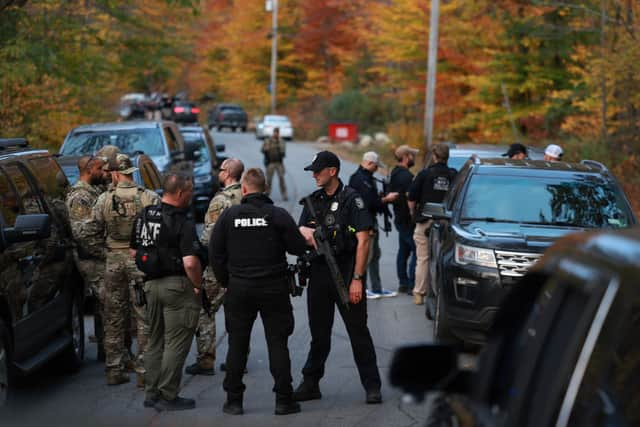Maine gunman's family raised mental health alarm with police five months before deadly mass shooting
and live on Freeview channel 276
Five months before the deadliest shooting in Maine's history, the family of the suspected gunman contacted police with concerns about his deteriorating mental health.
Authorities revealed on Monday (30 October) that Robert Card's family told the county sheriff's office in May that they were "concerned" about the 40-year-old's state of mind, especially given the fact that, as an army reservist, he had direct access to firearms. Sheriff Joel Merry said his deputies subsequently reached out to officials at Card's unit, who confirmed they would speak to him and ensure he received the necessary medical attention.
Advertisement
Hide AdAdvertisement
Hide AdThings deteriorated over the summer however, as Card was sent for a mental health assessment after he started "hearing voices" and "threats to shoot up" his army base in New York. He was released two weeks later, but on 15 September, in one of the final warning signs before the gun rampage which killed 18 people, a soldier told officials that he was afraid Card was "going to snap and commit a mass shooting" because he was hearing voices again.
A sheriff's deputy visited Card's home, but was unable to locate him that day or the next - prompting a statewide alert to be sent out to officers asking for help to locate Card, alongside a warning that he was known to be "armed and dangerous". Card's army reserve unit decided to take away his military-issued firearms, and the 40-year-old was declared "non-deployable" after several unsuccessful attempts were made to contact him.
The officer who visited Card's home reached out to the suspected gunman's brother in a last attempt to locate him, and the brother said he had put Card's firearms in a safe on the family farm - and would ensure he could not access them. However, while searching for Card after the deadly mass shooting, authorities recovered a multitude of weapons which they believe he had legally purchased.


Eighteen people were killed on the evening of 25 October after a gunman opened fire at a bowling alley and restaurant in the small town of Lewiston, Maine. Following an intense two-day manhunt, the suspect in the case, identified as 40-year-old Robert Card, was found dead of a self-inflicted gunshot wound.
Advertisement
Hide AdAdvertisement
Hide AdThe documents made public by the sheriff’s office on Monday (30 October) provided the most detailed timeline yet of the events leading up to the rampage, offering information on the warning signs about Card's behaviour and the subsequent failures to prevent the deaths of 18 innocent people.
The tragic incident has also revived the long-running debate around gun safety laws in the United States, especially considering the fact that Card, who already had familiarity with guns due to his work in the army, was still able to access weapons while struggling with mental health.
Maine governor Janet Mills, a Democrat, said in a new conference on Monday (30 October) that state lawmakers would revisit Maine's gun control laws, but things turned contentious when she was pushed for further detail. "I’m not going to stand here today and tell you I’m proposing X, Y, and Z," she said. "I’m here to listen, work with others, and get people around the table as promptly as possible."
It came as residents of Lewiston, Maine, returned to work - the morning after more than 1,000 people had attended a vigil at Basilica of Saints Peter and Paul to mourn those lost in the shootings.
Advertisement
Hide AdAdvertisement
Hide AdThe events of 25 October represented the deadliest shooting in the history of Maine - a state which has generally seen relatively little crime. The latest gun rampage was the 36th mass killing in the US in 2023, according to a database maintained by the Associated Press and USA Today, in partnership with Northeastern University in Boston, Massachussets.
Comment Guidelines
National World encourages reader discussion on our stories. User feedback, insights and back-and-forth exchanges add a rich layer of context to reporting. Please review our Community Guidelines before commenting.
